共享经济的困境 中英文
共享经济的好处和局限性英语作文

共享经济的好处和局限性英语作文The Benefits and Limitations of the Sharing EconomyThe sharing economy, also known as collaborative consumption, is a socio-economic system built on the sharing of resources. It involves the sharing of goods and services among individuals, often facilitated by technology platforms. While the sharing economy has gained popularity in recent years, it has both benefits and limitations that need to be considered.Benefits of the Sharing Economy:1. Cost savings: One of the primary benefits of the sharing economy is cost savings. By sharing resources such as cars, homes, and equipment with others, individuals can reduce their expenses significantly. This can be particularly useful for those on a tight budget or looking to save money.2. Environmental impact: The sharing economy can also havea positive impact on the environment by reducing waste and promoting sustainability. By sharing resources instead of buying new ones, less waste is produced, and fewer resources are consumed, which can help to reduce the carbon footprint.3. Increased access: The sharing economy provides individuals with access to goods and services that they may nothave been able to afford otherwise. This can be especially beneficial for those in underserved communities or with limited financial means, as it can provide them with access to essential resources.4. Social connections: The sharing economy can help to build social connections and foster a sense of community. By sharing resources with others, individuals can form relationships and partnerships that can lead to mutual benefit and support.Limitations of the Sharing Economy:1. Quality control: One of the limitations of the sharing economy is the lack of quality control. Since shared goods and services are often owned and maintained by individuals, there is a risk of receiving low-quality or subpar items. This can impact the overall experience and satisfaction of users.2. Regulation: The sharing economy operates in a largely unregulated space, which can lead to issues related to safety, liability, and accountability. Without proper regulations in place, there is a risk of exploitation, fraud, and legal disputes.3. Privacy concerns: The sharing economy relies heavily on the use of technology platforms to facilitate transactions, which can raise privacy concerns. Personal information and data areoften shared with third-party providers, raising questions about data security and protection.4. Inequality: The sharing economy has been criticized for exacerbating existing social and economic inequalities. While it can provide access to resources for some, it may also exclude others who do not have the means or ability to participate in the sharing economy.In conclusion, the sharing economy has the potential to bring about positive change by promoting collaboration, sustainability, and financial savings. However, it also presents challenges related to quality control, regulation, privacy, and inequality that need to be addressed. By recognizing and addressing these limitations, the sharing economy can continue to evolve and thrive as a viable alternative to traditional consumption models.。
共享经济的优势和劣势英语作文
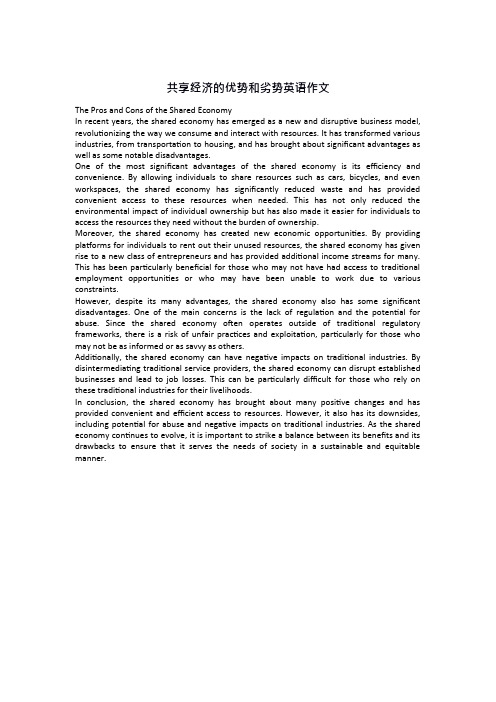
共享经济的优势和劣势英语作文The Pros and Cons of the Shared EconomyIn recent years, the shared economy has emerged as a new and disruptive business model, revolutionizing the way we consume and interact with resources. It has transformed various industries, from transportation to housing, and has brought about significant advantages as well as some notable disadvantages.One of the most significant advantages of the shared economy is its efficiency and convenience. By allowing individuals to share resources such as cars, bicycles, and even workspaces,the shared economy has significantly reduced waste and has provided convenient access to these resources when needed.This has not only reduced the environmental impact of individual ownership but has also made it easier for individuals to access the resources they need without the burden of ownership.Moreover,the shared economy has created new economic opportunities.By providing platforms for individuals to rent out their unused resources, the shared economy has given rise to a new class of entrepreneurs and has provided additional income streams for many. This has been particularly beneficial for those who may not have had access to traditional employment opportunities or who may have been unable to work due to various constraints.However,despite its many advantages,the shared economy also has some significant disadvantages. One of the main concerns is the lack of regulation and the potential for abuse.Since the shared economy often operates outside of traditional regulatory frameworks, there is a risk of unfair practices and exploitation, particularly for those who may not be as informed or as savvy as others.Additionally, the shared economy can have negative impacts on traditional industries. By disintermediating traditional service providers, the shared economy can disrupt established businesses and lead to job losses. This can be particularly difficult for those who rely on these traditional industries for their livelihoods.In conclusion,the shared economy has brought about many positive changes and has provided convenient and efficient access to resources. However, it also has its downsides, including potential for abuse and negative impacts on traditional industries. As the shared economy continues to evolve, it is important to strike a balance between its benefits and its drawbacks to ensure that it serves the needs of society in a sustainable and equitable manner.。
共享经济弊端英语作文
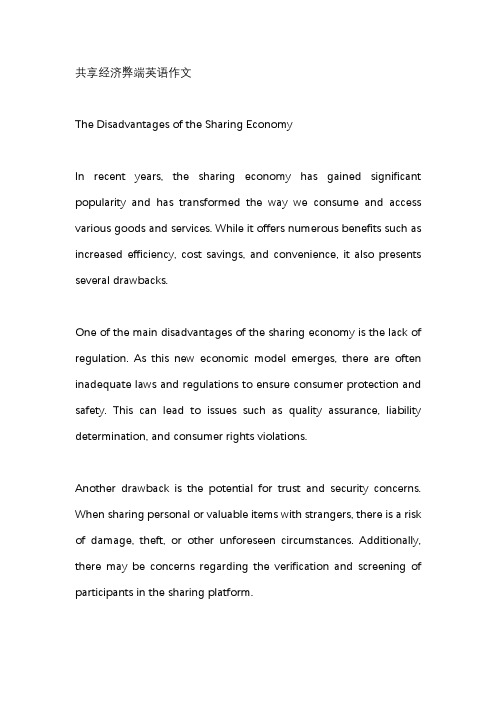
共享经济弊端英语作文The Disadvantages of the Sharing EconomyIn recent years, the sharing economy has gained significant popularity and has transformed the way we consume and access various goods and services. While it offers numerous benefits such as increased efficiency, cost savings, and convenience, it also presents several drawbacks.One of the main disadvantages of the sharing economy is the lack of regulation. As this new economic model emerges, there are often inadequate laws and regulations to ensure consumer protection and safety. This can lead to issues such as quality assurance, liability determination, and consumer rights violations.Another drawback is the potential for trust and security concerns. When sharing personal or valuable items with strangers, there is a risk of damage, theft, or other unforeseen circumstances. Additionally, there may be concerns regarding the verification and screening of participants in the sharing platform.Furthermore, the sharing economy can have an impact on traditional industries and local businesses. It may disrupt existing markets and compete with established providers, causing financial hardships for some businesses.Moreover, there are challenges related to labor and employment. The nature of sharing economy work can lead to uncertainty in terms of job stability, benefits, and working conditions for the providers.To mitigate these disadvantages, it is essential for governments and platforms to establish effective regulations and safeguards. This includes setting standards for quality, security, and consumer protection. Additionally, users should exercise caution and make informed decisions when engaging in sharing economy activities.In conclusion, the sharing economy has its advantages, but it also comes with notable disadvantages. By addressing these concerns and finding appropriate solutions, we can maximize the benefits while minimizing the negative impacts.希望这篇作文对你有所帮助!如果你还有其他需求,请随时告诉我。
怎样看待共享经济英语作文

怎样看待共享经济英语作文英文回答:The sharing economy is a socio-economic ecosystem built around the sharing of human, physical, and intellectual resources. It is based on the idea that people can access goods and services without owning them. The sharing economy has been growing rapidly in recent years, thanks to therise of the internet and mobile technology.There are many benefits to the sharing economy. For consumers, it can save money, reduce waste, and provide access to a wider range of goods and services. For businesses, it can reduce costs, increase efficiency, and tap into new markets. For the environment, it can help to reduce pollution and conserve resources.However, there are also some challenges associated with the sharing economy. One challenge is that it can lead to the exploitation of workers. Another challenge is that itcan create new forms of inequality. For example, people who own assets may be able to profit from the sharing economy, while those who do not may be left behind.Overall, the sharing economy has the potential to be a positive force for change. However, it is important to address the challenges associated with it in order to ensure that it benefits everyone.中文回答:共享经济的理解。
论共享经济英语作文
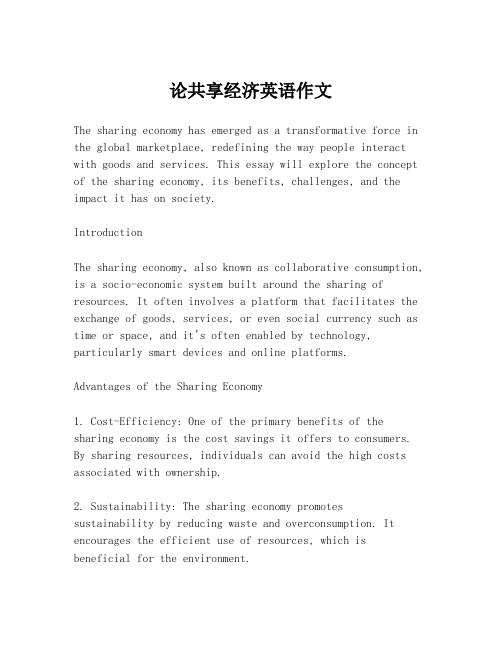
论共享经济英语作文The sharing economy has emerged as a transformative force in the global marketplace, redefining the way people interact with goods and services. This essay will explore the concept of the sharing economy, its benefits, challenges, and the impact it has on society.IntroductionThe sharing economy, also known as collaborative consumption, is a socio-economic system built around the sharing of resources. It often involves a platform that facilitates the exchange of goods, services, or even social currency such as time or space, and it's often enabled by technology, particularly smart devices and online platforms.Advantages of the Sharing Economy1. Cost-Efficiency: One of the primary benefits of the sharing economy is the cost savings it offers to consumers. By sharing resources, individuals can avoid the high costs associated with ownership.2. Sustainability: The sharing economy promotessustainability by reducing waste and overconsumption. It encourages the efficient use of resources, which isbeneficial for the environment.3. Accessibility: It increases accessibility to goods and services that might otherwise be unaffordable or inconvenient to obtain, thus promoting inclusivity.4. Community Building: Sharing platforms often foster a sense of community among users, as they share not just assets but also experiences and reviews.Challenges of the Sharing Economy1. Regulation and Legal Issues: The rapid growth of the sharing economy has outpaced regulatory frameworks, leading to legal disputes and challenges in areas such as taxation, licensing, and insurance.2. Job Security and Worker Rights: The sharing economy has been criticized for its impact on traditional employment, with concerns about job security, fair wages, and workers' rights for those in the gig economy.3. Privacy and Security: There are concerns about the privacy and security of users, as sharing platforms require personal information and can be vulnerable to data breaches.4. Quality Control: Ensuring consistent quality and safety standards can be a challenge when goods and services are provided by a wide range of individuals rather than a single entity.Impact on SocietyThe sharing economy has had a profound impact on society, changing consumer behavior and expectations. It has led to a shift from ownership to access, where people value experiences and utility more than possession. This has significant implications for urban planning, environmental policy, and economic development.ConclusionThe sharing economy represents a significant shift in how goods and services are provided and consumed. While it offers many benefits, including cost savings, sustainability, and accessibility, it also presents challenges that need to be addressed. As this economic model continues to evolve, itwill be crucial for stakeholders, including governments, businesses, and consumers, to work together to maximize its potential while mitigating its risks. The sharing economy is not just a trend but a new way of interacting that has the power to reshape our economic landscape and social structures for the better, provided it is managed responsibly and ethically.。
如何应对共享经济带来的挑战和机遇英语作文
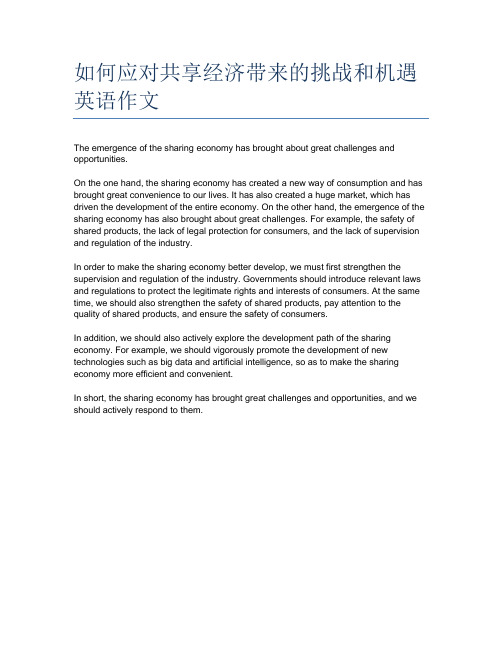
如何应对共享经济带来的挑战和机遇英语作文The emergence of the sharing economy has brought about great challenges and opportunities.On the one hand, the sharing economy has created a new way of consumption and has brought great convenience to our lives. It has also created a huge market, which has driven the development of the entire economy. On the other hand, the emergence of the sharing economy has also brought about great challenges. For example, the safety of shared products, the lack of legal protection for consumers, and the lack of supervision and regulation of the industry.In order to make the sharing economy better develop, we must first strengthen the supervision and regulation of the industry. Governments should introduce relevant laws and regulations to protect the legitimate rights and interests of consumers. At the same time, we should also strengthen the safety of shared products, pay attention to the quality of shared products, and ensure the safety of consumers.In addition, we should also actively explore the development path of the sharing economy. For example, we should vigorously promote the development of new technologies such as big data and artificial intelligence, so as to make the sharing economy more efficient and convenient.In short, the sharing economy has brought great challenges and opportunities, and we should actively respond to them.。
共享经济的优势和劣势英语作文
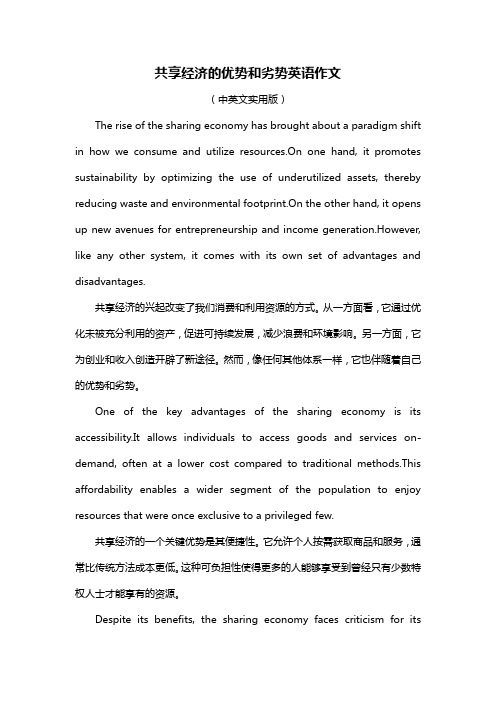
共享经济的优势和劣势英语作文(中英文实用版)The rise of the sharing economy has brought about a paradigm shift in how we consume and utilize resources.On one hand, it promotes sustainability by optimizing the use of underutilized assets, thereby reducing waste and environmental footprint.On the other hand, it opens up new avenues for entrepreneurship and income generation.However, like any other system, it comes with its own set of advantages and disadvantages.共享经济的兴起改变了我们消费和利用资源的方式。
从一方面看,它通过优化未被充分利用的资产,促进可持续发展,减少浪费和环境影响。
另一方面,它为创业和收入创造开辟了新途径。
然而,像任何其他体系一样,它也伴随着自己的优势和劣势。
One of the key advantages of the sharing economy is its accessibility.It allows individuals to access goods and services on-demand, often at a lower cost compared to traditional methods.This affordability enables a wider segment of the population to enjoy resources that were once exclusive to a privileged few.共享经济的一个关键优势是其便捷性。
中国共享经济现状英语作文
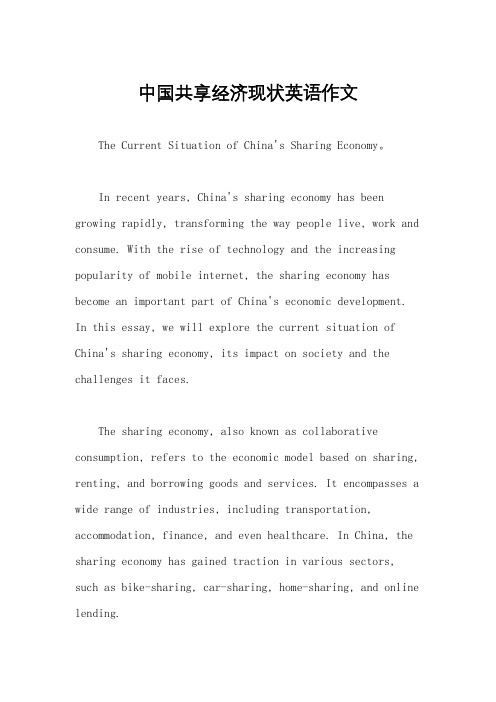
中国共享经济现状英语作文The Current Situation of China's Sharing Economy。
In recent years, China's sharing economy has been growing rapidly, transforming the way people live, work and consume. With the rise of technology and the increasing popularity of mobile internet, the sharing economy has become an important part of China's economic development. In this essay, we will explore the current situation of China's sharing economy, its impact on society and the challenges it faces.The sharing economy, also known as collaborative consumption, refers to the economic model based on sharing, renting, and borrowing goods and services. It encompasses a wide range of industries, including transportation, accommodation, finance, and even healthcare. In China, the sharing economy has gained traction in various sectors, such as bike-sharing, car-sharing, home-sharing, and online lending.One of the most prominent examples of China's sharing economy is the bike-sharing industry. Companies like Mobike and Ofo have revolutionized urban transportation by providing convenient, affordable and environmentally friendly bike-sharing services. With a few taps on their smartphones, users can easily locate and unlock bikes for short trips around the city. This has significantly reduced traffic congestion and air pollution, making cities more livable and sustainable.In the accommodation sector, platforms like Airbnb and Tujia have disrupted the traditional hotel industry by allowing individuals to rent out their homes or spare rooms to travelers. This not only provides travelers with more diverse and affordable lodging options but also allows homeowners to earn extra income. Similarly, in the car-sharing industry, companies like Didi Chuxing and Car2go have provided convenient and cost-effective alternatives to owning a car, reducing the overall demand for private car ownership.In the financial sector, peer-to-peer lending platforms like Lufax and WeBank have facilitated access to credit for small and medium-sized enterprises and individuals. By connecting borrowers and lenders directly through online platforms, these companies have provided a more efficient and inclusive way of allocating capital, bypassing traditional financial institutions.The sharing economy has also extended to the healthcare sector, with the emergence of online healthcare platforms like Ping An Good Doctor and Chunyu Doctor. These platforms provide users with access to medical consultations, prescriptions, and even diagnostic services through their smartphones, making healthcare more accessible and convenient.The rapid growth of China's sharing economy has brought about significant social and economic benefits. It has created new job opportunities, promoted entrepreneurship, and improved resource utilization. By sharing resources and assets, the sharing economy has the potential to reduce waste, increase efficiency, and promote sustainabledevelopment.However, the sharing economy also faces several challenges. One of the main challenges is regulation and oversight. The rapid expansion of the sharing economy has raised concerns about consumer safety, data privacy, and fair competition. There is a need for clear and comprehensive regulations to ensure the healthy development of the sharing economy and protect the rights and interests of all parties involved.Another challenge is trust and reputation. In a sharing economy, trust is essential for the smooth operation of platforms and the safety of users. Building and maintaining trust among users, providers, and platforms is crucial for the long-term success of the sharing economy.Furthermore, the sharing economy has also raised questions about its impact on traditional industries and employment. While the sharing economy has created new job opportunities, it has also disrupted traditional business models and raised concerns about job security and laborrights.In conclusion, China's sharing economy is experiencing rapid growth and has the potential to transform the way people live, work, and consume. It has brought about significant social and economic benefits, but also faces challenges that need to be addressed. With the right regulations and oversight, the sharing economy can continue to thrive and contribute to China's economic development and social progress.。
- 1、下载文档前请自行甄别文档内容的完整性,平台不提供额外的编辑、内容补充、找答案等附加服务。
- 2、"仅部分预览"的文档,不可在线预览部分如存在完整性等问题,可反馈申请退款(可完整预览的文档不适用该条件!)。
- 3、如文档侵犯您的权益,请联系客服反馈,我们会尽快为您处理(人工客服工作时间:9:00-18:30)。
共享经济的困境摘要:共享经济发展的迅速超乎了一些人的想象,2008年,一个叫做布莱恩•切斯基的家伙被迫在街头卖简易早餐只为凑齐自己接下来一个月的房租。
现如今,这个美国男人的公司Airbnb估值已达300亿美元,而这一切都源于那个正在国内炒得火热的“共享经济”。
共享经济似乎打破了一些传统的经济模式,一种全新的方式在市场上打开自己的局面,但是,随着其发展,一些问题也暴露了出来,是继续走下去还是就此止步,这时候似乎要做一个抉择了。
关键词:共享经济互联网正文:共享经济,一般是指以获得一定报酬为主要目的,基于陌生人且存在物品使用权暂时转移的一种新的经济模式。
其本质是整合线下的闲散物品、劳动力、教育医疗资源。
有的也说共享经济是人们公平享有社会资源,各自以不同的方式付出和受益,共同获得经济红利。
此种共享更多的是通过互联网作为媒介来实现的。
共享经济牵扯到三大主体,即商品或服务的需求方、供给方和共享经济平台。
共享经济平台作为连接供需双方的纽带,通过移动LBS应用、动态算法与定价、双方互评体系等一系列机制的建立,使得供给与需求方通过共享经济平台进行交易。
共享这个概念早已有之,然而随着互联网时代的真正到来,共享也成功升级为经济共享,而随着经济共享无偿分享的早期阶段的过去,基于陌生人间物品的使用权的暂时的转移而获得回报的共享经济模式使一些企业获得了超额的利润,如Uber、壁虎WiFi、Airbnb等都已成为行业的霸主。
经济似乎就要这样一直发展下去了,但是,其实共享经济走的并不是一帆风顺。
就是目前,共享经济依然面对着许多问题、甚至说是困境。
首先,共享经济最初的发展方向并不是房屋共享或WiFi共享,共享经济的理想也从来不是Uber也不是Airbnb。
2010年当雷切尔·博茨曼在TedxSydney上以租用电钻为例讲到共享经济时,他希望共享经济能够发展壮大的正是这类能够扎根社区,方便最大众人群的平台,如果你需要电钻,去平台上跟邻居租而不是买,如果你需要梯子,去平台上跟邻居租而不是买……共享经济的开端始于2007年成立的Ecomodo,2009年成立的NeighborGoods、2010年成立的SnapGoods,那个时候几乎很少有人注意到几乎在同一时间成立的Airbnb以及Uber(它们先后与2008和2009年成立),媒体在说到共享经济时一致以NeighborGoods 为例。
然而到了最后,共享经济中发展得最好的当属Airbnb与uber、壁虎Wi-Fi等开始没有被注重的方向。
或许,这已经有点脱离了共享经济的初衷。
但是也是经济的共享吧,如果能按这条道路将经济资源利用起来,也未为不可,然而,新的问题又出现在了经济分享上。
就以目前发展的所谓的共享经济来说,问题也是存在的。
就说最火的Airbnb吧,Airbnb 在《华尔街日报》发布的全球创业公司估值排行榜上名列第四,其最新一轮的估值达到 255 亿美元。
似乎很优异,不是么?但是Airbnb最近的日子很糟糕,至少看起来他们很糟糕:纽约州是 Airbnb 在美国最大的市场,但是纽约州的监管方却对Airbnb非常不客气,他们判定 Airbnb 的房屋分享模式是违法行为。
旧金山是Airbnb 在美国的另一个大市场,更是该公司的大本营,Airbnb就是在旧金山诞生的,但是旧金山同样对Airbnb非常不客气。
Airbnb于今年七月正式发起诉讼,和旧金山市政府对簿公堂。
在中国,Airbnb的发展似乎也面临着问题,因为在我国,合法的转租需要满足两个条件:1、转租须经房屋所有权人的同意。
2、转租的租金不得高于原租金,如确实需合理提高,提高的收入应交给房屋所有权人。
所以,如果企业想在中国进行房屋的转租,面临着许多困难,而单单依靠房主自己转租房屋,出租房的量是远远不够的。
除了Airbnb,Uber司机的身份也是一个值得探讨的问题。
Uber公司在去年7月的一起诉讼中辩称,“Uber司机不是Uber的全职员工”。
对此,加州劳工专员办公室有不同的意见。
他们表示,Uber及其加州子公司“认为他们只是中立的技术平台,其设计是帮助司机和乘客处理交通业务。
然而事实情况是,被告参与了业务运营的每个方面”。
因此,加州劳工专员办公室认为,Uber司机理应被认定为Uber的员工,享受属于全职职工的全部合法权益。
事实上,不管Uber是否承认Uber司机是全职职工,“全职”的Uber司机都已经出现了。
如何保护这部分劳动者的权益是值得监管部门考虑的问题。
一旦这些共享平台的服务提供者从兜售空闲资源转变为全职服务提供商,共享经济的性质也就开始发生了改变。
这种转变对平台与服务提供者自身都是一种挑战,他们很可能面临被监管部门"重点照顾"的风险。
中国的另一个出行经济共享代表是滴滴打车,而其也面临着同样的问题,而且,这些产业由于刚刚发展起来,或者说是模式本身的缺陷,出行经济共享服务安全问题频发。
总的来说,但从目前市场上的共享经济项目来看,总的来说,能够提供标准化服务的商业模式已经取得了一定的成功,例如滴滴打车和Airbnb,打车和租房都是固定的服务模式,在硬件上很容易改造升级,软性服务对人的要求也并不高,但是非标准化话的服务目前却鲜有平台能够做的很好,最大的问题集中在以下几点:1)共享经济领域进入门槛低,导致很多并不了解行业或没有行业资源的人入局。
2)缺乏严格的管理措施和手段,无法保证服务品质成为共享经济的极大诟病。
3)为融资目的疯狂提升用户数量和服务商数量,忽略产品本身4)服务难以标准化,参差不齐的服务质量导致很难形成规模化的品牌。
或许随着经济共享模式本身的发展,这些问题可以慢慢地在发展中解决完善。
有人说:共享经济的理想是当今最伟大的理想之一,希望共享经济可以走得更远吧。
The dilemma of the shared economyAbstract:The sharing of the economy grew faster than some people imagined. In 2008, a guy called Brian Chesky was forced to sell a simple breakfast in the street just to get his rent for the next month. Now, the American men's company Airbnb valuation has reached 30 billion US dollars, and all this comes from the fiery domestic speculation in the shared “economy". Sharing the economy seems to break some of the traditional economic model, a new way to open their own situation in the market, but, with its development, some problems are exposed. It is a time seems to make a choice to continue or stop.Key words: Shared Economy InternetText:Sharing the economy, generally refers to get a certain reward as the main purpose, based on strangers and the temporary transfer of the right to use a new economic model. Its essence is the integration of the line under the idle items, labor, education, medical resources. Some also say that sharing the economy is that people enjoy social resources fairly, each in different ways to pay and benefit, the common access to economic dividends. Such sharing is more through the Internet as a medium to achieve. Sharing the economy involves three main bodies: First, the demand side of goods or services. Second, the supply side and, third, the sharing of economic platform. As a link between supply and demand, the sharing economic platform is established by moving LBS application, dynamic algorithm and pricing, mutual evaluation system and so on. So that supply and demand side can trade through sharing economic platform. The concept of sharing is long overdue, but with the true arrival of the Internet age, sharing has also been successfully upgraded to economic sharing and, with the passing of the early stages of economic sharing free of charge sharing, the temporary transfer of the right to use goods between strangers The return of the shared economic model to enable some companies to obtain excess profits, such as Uber, Gecko WiFi, Airbnb, etc. have become the dominant industry. The economy seems to have been so continue to develop, but in fact share the economy is not easy to go. At present, the shared economy is still faced with many problems, or even that is difficult.First of all, the shared economy is not the initial direction of housing sharing or WiFi sharing, sharing the ideal economy has never been Uber nor Airbnb. When Rachel Bertzman in 2010 TedxSydney to hire electric drill, for example, shared economy, he hopes to share the economy can grow and develop is able to take root in this community, the most popular crowd platform, if you need Electric drill, to the platform with the neighbors to rent rather than buy, if you need a ladder, go to the platform with the neighbors to rent rather than buy ... The beginning of the shared economy started in 2007 Ecomodo, established in 2009 NeighborGoods, established in 2010 SnapGoods, at that time almost no one noticed almost at the same time to set up Airbnb and Uber (they have with 2008 and 2009), the media said to share the economy in the same NeighborGoods as an example. However, in the end, sharing the development of the economy was undoubtedly the best Airbnb and uber, gecko Wi-Fi, etc. have not been focused on the direction. Perhaps, this has been a bit out of the original intention of sharing the economy.But it is also the sharing of economic bar, if we can use up economic resources in this road, it also can be accepted. However, new problems have appeared in this form economic sharing.So far as the so-called shared economy is concerned, problems also exist. Airbnb, the hottest Airbnb, ranked fourth on the Wall Street Journal's list of global start-up valuations, with its latest round of valuation valued at $ 25.5 billion. Seems very good, is not it? But Airbnb's recent days are bad, at least they look bad: New York is Airbnb's largest market in the United States, but regulators in New York are very unkind to Airbnb, they determine Airbnb's housing sharing model is illegal. San Francisco is Airbnb in the United Statesanother big market, is the company's headquarters, Airbnb was born in San Francisco, but San Francisco is also Airbnb very blunt. Airbnb formally launched a lawsuit in July this year, and the San Francisco city hall against court. In China, Airbnb development seems to be facing problems, because in China, the legal sublease need to meet two conditions:1, sublease subject to the consent of the owner of the house.2, the sublease of the rent shall not be higher than the original rent, if indeed a reasonable increase, the increase in income should be handed over to the owner of the house. Therefore, if the enterprises want to sublet the house in China, faced with many difficulties, and only rely on the owner to sublease their own houses, the amount of rental housing is far from enough.In addition to Airbnb, Uber driver's identity is also a question worth exploring. In a lawsuit last July, Uber argued, "Uber drivers are not Uber's full-time employees." In this regard, the California Office of the Commissioner of Labor have different views. They say Uber and its California subsidiary "think of them as a neutral technology platform designed to help drivers and passengers deal with the traffic business, but the fact is that the defendants are involved in every aspect of the business." Therefore, the California Office of the Commissioner of Labor that, Uber drivers should be identified as Uber employees, enjoy full-time employees of all the legitimate rights and interests.In fact, regardless of Uber whether Uber drivers are full-time employees, "full-time" Uber drivers are already there. How to protect the rights and interests of this part of the workers is worthy of consideration of regulatory issues. The nature of the shared economy begins to change once the service providers of these shared platforms transition fromselling idle resources to full-time service providers. This shift is a challenge for both the platform and the service providers themselves, who are likely to face the risk of being "cared for" by regulators. China's other economic representatives of sharing travel is a drop of a taxi, and it is also facing the same problem, and that these industries have just developed, or is the model itself flawed travel sharing services security issues frequently.Overall, but from the current market share of economic projects, in general, can provide standardized service business model has achieved some success, such as the drop of a taxi and Airbnb, taxi and rental are fixed Service mode, the hardware is easy to upgrade, soft service requirements of the people is not high, but non-standardized services, but now few platforms can do very well, the biggest problem is concentrated in the following points:1) Low barriers to entry into the shared economy, resulting in a lot of people do notunderstand the industry or no industry resources into the Council.2) The lack of strict management measures and means, can not guarantee the qualityof service to become a great criticism of shared economy.3) For the purpose of financing crazy to enhance the number of users and the numberof service providers, ignoring the product itself.4) Difficult to standardize the service, uneven quality of service lead to difficult to formlarge-scale brand.Perhaps with the development of the economic sharing model itself, these problems can be solved gradually in the development of sound. Some people say: the ideal of sharing the economy is one of the greatest ideals of today, hope to share the economy cango further.程伟415010122016.12.21。
